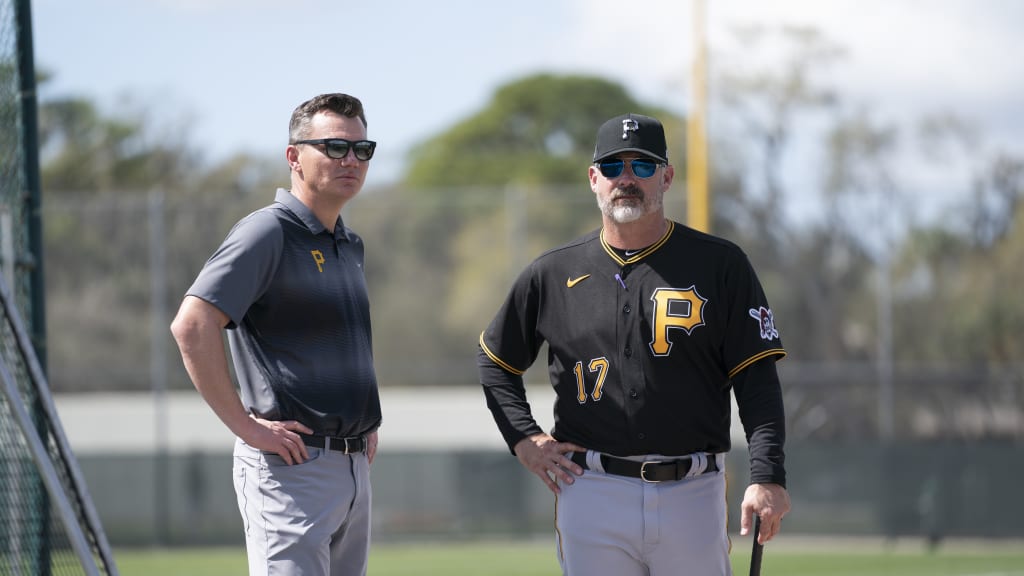
During Spring Training, Pirates general manager Ben Cherington sat down with MLB.com to discuss his first offseason on the job and what he’s learned since serving as general manager of the Red Sox from 2011-15. This is the fourth and final part of a series looking at how he’s applying those lessons in Pittsburgh.
PITTSBURGH -- The Pirates were not the only team interested in hiring Ben Cherington to run their baseball operations department, but they offered the only job Cherington was interested in taking.
On Oct. 4, 2018, MLB Network insider Ken Rosenthal reported that Cherington took himself out of the running for high-ranking positions with the Giants and Mets -- jobs that later went to Farhan Zaidi and Brodie Van Wagenen, respectively. Cherington wanted to be a general manager again, Rosenthal reported on Twitter, but only for an organization he could build from the “ground up.”
But the Pirates haven’t completely overhauled their roster since Cherington took over, nor has there been a major front-office shakeup since Travis Williams, Cherington and Steve Sanders replaced Frank Coonelly, Neal Huntington and former assistant GM Kyle Stark.
“By ‘ground up,’ what I think I meant was that I really want to have an opportunity to help people and affect processes throughout baseball operations, be in a place where that’s important and that’s possible -- and not strictly be only focused on managing a 25-man roster,” Cherington said this spring.
Williams has pointed to the A’s, Rays and Brewers as recent examples of clubs to “crack the code of winning in a market like Pittsburgh.” The team president said he viewed Cherington as an executive who can create a similarly sustainable contender by building from within. In other words, the Pirates offered Cherington an opportunity to have a hand in everything -- to shape the organization from the ground up.
But those two words understandably, if not accurately, created the expectation for immediate action in Pittsburgh. To build something from the ground up, you first must tear down any existing structure. The Pirates’ regime change, coming off a 69-win season with one of the Majors’ lowest payrolls, seemed to signal the start of a full-scale teardown followed by a multi-year rebuilding process.
However, Cherington has actively avoided calling Pittsburgh’s plan a rebuild. And he wants to make it clear he’s not here just to improve its scouting and player development at the expense of the Major League team.
“I am very interested in what’s going on in this room,” Cherington said, pointing toward the clubhouse at LECOM Park. “I am very interested and focused, frankly, more on the Major League area than any other area -- by far.
“It doesn’t mean we won’t make player moves. Of course we will. And as we build toward a winning team, those will be different. Those will start looking different. I’m interested in all of baseball operations, not just the Major League team.”
Cherington hasn’t publicly set a competitive timeline for the Pirates, but he’s often used that phrasing: “Build toward a winning team.” When he was hired in late October, Williams asked fans to be patient because the organization couldn’t simply “flip the switch and all of a sudden have a winner on the field.” If they expected to contend this year, they wouldn’t have traded center fielder Starling Marte to the D-backs for two high-ceiling Class A prospects.
So why not just call it a rebuild? Beyond semantics, what’s the difference between a build and a rebuild?
For one, Cherington doesn’t believe the Pirates need to tear it all down, because the foundation of their next winning team is already in place. The general manager will admit the Pirates need more impact talent to succeed, but he’s repeatedly stressed his belief in the young players and prospects who were in camp this spring.
That core includes Josh Bell, Joe Musgrove, Bryan Reynolds, Kevin Newman, Mitch Keller, Ke’Bryan Hayes and others -- some of whom the club reportedly considered extending before Spring Training was shut down. Their farm system isn’t ranked among the best in the game, but they have another wave of pitching prospects coalescing in Class A, led by Quinn Priester, Brennan Malone and Tahnaj Thomas.
“We really do have a really strong group of young players who are going to have a chance to be here for a while and have a chance to get better individually and collectively,” Cherington said, “and we can build around them.”
There’s bound to be change over time, Cherington admitted, and that applies to the front office as well. One of the attributes Williams highlighted during Cherington’s introductory press conference was his reputation as a “talent magnet”, someone who has shown an ability to identify, attract and mentor promising young executives. Yet Sanders, one of two assistant GMs, was Cherington’s only high-profile baseball operations hire this offseason.
Farm director Larry Broadway, scouting director Steve Williams and amateur scouting director Joe DelliCarri are all still in place, as are informatics director Dan Fox and international scouting director Junior Vizcaino. The Pirates made a few additions to bolster the club’s scouting and analytics staff, but Cherington didn’t feel like he needed to proactively dismiss a bunch of holdovers before he learned more about them.
Just the opposite: Cherington cited the existing personnel as another strength of the organization. He even reached out to Huntington, his predecessor and friend, for his perspective on Pirates players and staff. (It was Huntington, Cherington said, who “made it not awkward” by offering his support.)
“I really believe there are good people everywhere, smart people, people who really care,” Cherington said. “As a leader, I think one of the most important parts of the job is to figure that out, learn about what's here, who's here and what people are capable of. Some are capable of more. Some might rather be doing something else. Some might be more fulfilled if their roles are adjusted or whatever. But there's all those things you have to learn, and there can be a benefit from getting some fresh eyes on that.”
That makes this period complicated for the Pirates. They’ve prioritized health and safety above baseball concerns, but they know they’re losing valuable time for development and evaluation. Their young players are creeping toward free agency and arbitration eligibility without taking the field. The Draft and international signing period, two avenues to add talent, will be affected as well.
“There’s still opportunity to develop relationships, but it sure feels a lot different than what any of us were expecting,” Cherington said recently. “It is such a new paradigm to do this job in. Whether you’ve been in this chair for 30 years or five months, it’s such a different way of doing the job that I’m not sure anyone has a particular advantage.”
Amid all that uncertainty, Cherington has embarked upon what figures to be a more complicated journey than his wintertime walks across General Robinson Street to work: using what he’s learned to build a consistently competitive team in Pittsburgh.
“The things that I enjoy doing the most tend to be working with people to help figure out solutions and ways forward in all the areas that I think the Pirates need to be really great at to win,” Cherington said. “How are we evaluating international players? How are we evaluating players from the Draft? How are we helping players get better? How are we deploying players at the Major League level? How are we creating an environment where players and staff can thrive?
“I don’t have all the answers on how to do that, but we need to be great at all those things. I get more fulfillment at a job with helping people figure that out than I do from any single player transaction. It seemed to me like, if that’s the case, then this is a particular job in a particular place where it’s exciting to me that those things really matter in a place like Pittsburgh, and that’s the stuff I enjoy doing.”


